Why do Korean parents choose to lock themselves in prison cells?
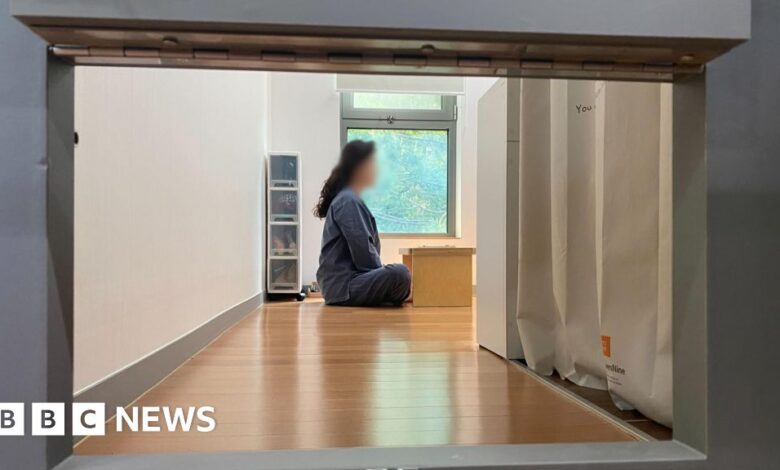
Via Hyojung Kim, BBC Korea
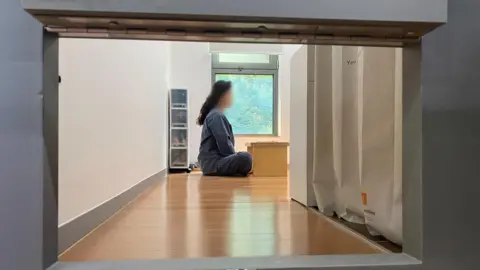 Korea Youth Foundation
Korea Youth FoundationThe only thing connecting each small room at the Happiness Factory to the outside world is a feeding hole in the door.
No phones or laptops are allowed inside these cells, which are about the size of a locker, and residents have only blank walls for company.
The residents may wear blue prison uniforms but they are not prisoners – they come to the centre in South Korea to “experience being in prison”.
Most people here have children who have been completely cut off from society and have personally experienced the feeling of being cut off from the world.
Solitary detention room
Reclusive young people like the children of these residents are called hikikomori, a term coined in Japan in the 1990s to describe severe social alienation among adolescents and young adults.
Last year, a survey by the South Korean Ministry of Health and Welfare of 15,000 people aged 19 to 34 found that more than 5% of respondents were self-isolating.
If this represents the entire population of South Korea, that means there are about 540,000 people in the same situation.
Since April, parents have participated in a 13-week parent education program sponsored and run by nongovernmental organizations (NGOs) Korea Youth Foundation and Blue Whale Rehabilitation Center.
The purpose of this program is to teach people how to communicate better with their children.
The program includes three days at a facility in Hongcheon-gun, Gangwon Province, where participants will stay in a room that simulates an isolation cell.
Hopefully isolation will help parents gain a deeper understanding of their children.
‘Emotional prison’
Jin Young-hae’s son has been isolating himself in his bedroom for three years now.
But since being detained herself, Ms. Jin (not her real name) has better understood the “emotional prison” of her 24-year-old daughter.
“I always wonder what I did wrong… it hurts to think about it,” said the 50-year-old.
“But when I started reflecting, I understood better.”
Reluctance to talk
Ms. Jin said her son has always been talented and she and his father have high expectations for him.
But he was often sick, struggled to maintain friendships and eventually developed an eating disorder, making school difficult.
When her son started college, he seemed to do well for a semester—but one day, he completely withdrew.
Seeing him lock himself in his room, neglecting personal hygiene and eating, she was extremely heartbroken.
But although anxiety, difficulties in relationships with family and friends and the disappointment of not being accepted to a top university may have affected her son, he was reluctant to speak. with her about what was really wrong.
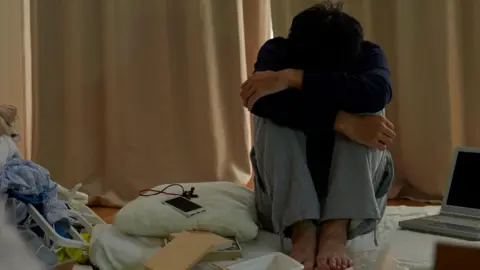 beautiful pictures
beautiful picturesWhen Ms. Jin arrived at the Happiness Factory, she read notes written by other isolated young people.
“Reading those notes made me realize, ‘Ah, he’s protecting himself with silence because no one understands him,’” she said.
Park Han-sil (not his real name) came here for his 26-year-old son, who cut off all contact with the outside world 7 years ago.
After running away from home several times, he now rarely leaves his room.
Ms Park took the boy to see a counsellor and a doctor – but her son refused to take prescribed mental health medication and became obsessed with playing video games again.
interpersonal relationships
While Ms. Park is still trying to communicate with her son, she has begun to better understand her son’s feelings through the quarantine program.
“I realized that it is important to accept my child’s life without forcing him into a particular mold,” she says.
Research by the Korean Ministry of Health and Welfare shows that there are many factors that cause young people to isolate themselves.
According to the Ministry’s survey of 19- to 34-year-olds, the most common reasons were:
- difficulty finding a job (24.1%)
- problems with interpersonal relationships (23.5%)
- family problems (12.4%)
- health problems (12.4%)
South Korea has one of the highest suicide rates in the world and last year the government announced a five-year plan to tackle the problem.
Ministers have announced there will be state-funded mental health checks for 20-34 year olds every two years.
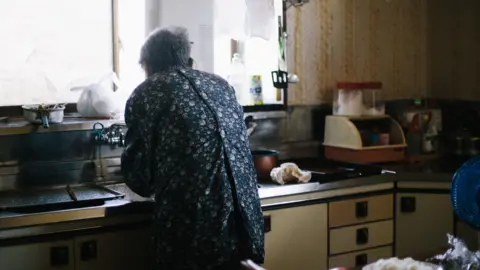 beautiful images
beautiful imagesIn Japan, the first wave of self-isolating youth in the 1990s led to a segment of middle-aged people dependent on their aging parents.
And trying to support their adult children on welfare alone has driven some older adults into poverty and depression.
Professor Jeong Go-woon, of Kyung Hee University’s sociology department, said Korean society’s expectation that important life milestones must be achieved at certain times increases anxiety. of young people – especially in times of economic stagnation and low employment.
The idea that a child’s success is a parent’s success contributes to the whole family’s isolation.
And many parents view their children’s difficulties as parenting failures, leading to feelings of guilt.
Professor Jeong said: “In Korea, parents often express their love and emotions through actions and practical roles rather than expressing them through words.”
“Parents funding their children’s education through hard work is a prime example of Confucian culture that emphasizes responsibility.”
This emphasis on hard work culture may reflect South Korea’s rapid economic growth in the second half of the 21st century, when the country became one of the world’s largest economies.
However, according to World Inequality Database, The country’s wealth inequality has worsened over the past three decades.
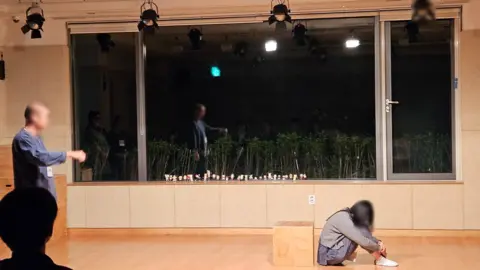 Korean Youth Foundation
Korean Youth FoundationBlue Whale Rehabilitation Center director Kim Ok-ran said the view that young people’s self-isolation is a “family matter” means many parents will also cut off ties with those around them.
And some people are so afraid of being judged that they can’t even talk to family members about their situation.
“They cannot publicize the issue, leading to the parents themselves becoming isolated,” Ms. Kim said.
“Usually, they stop attending family gatherings during the holidays.”
‘I’ve seen it too much’
Parents who come to the Happiness Factory for help are still eagerly awaiting the day their children can return to normal life.
When asked what she would say to her son if he finished his quarantine, Jin’s eyes welled up with tears.
“You’ve been through so much,” she said with a shaky voice.
“Is it difficult?
“I’ll watch out for you.”
If you are affected by any of the issues raised in this article, you can find resources from BBC Action Line.





